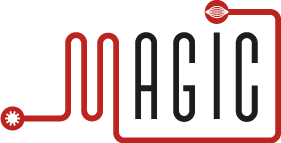What has been the most exciting part of being a part of the MAGIC team so far?
Karen English, Maynooth University: Interacting with and hearing from the clinicians who treat the patients that the MAGIC consortium is hoping to help. The wealth of experience within the consortium really is incredible and a huge learning opportunity for me.
Leah Zerlin, University College London: Being part of MAGIC has been an incredible experience, especially seeing how scientists from diverse fields come together to work on the same project. Seeing the collaboration unfold, and all of the parts of the consortium coming together with each expertise contributing to a shared goal, has been very inspiring.
Hildegarde Buening, Medical School of Hanover: The team spirit of the MAGIC team is incredible. We have joined to make a difference for patients suffering from neuromuscular diseases.
Why is it important to be part of a consortium such as MAGIC?
Isabelle Ringhofer, Dinamiqs: No single organization can solve the complex challenges of gene therapy alone. MAGIC brings together expertise from different areas, making real progress possible.
Ilaria Zito, Parent Project Italy: As a consortium, we work in a fascinating and ever-changing field and we know that together, we can make a difference.
Stefania Capone, ReiThera: Being part of MAGIC allows us to share knowledge, resources, and technologies, ensuring that our research is more impactful and progresses more quickly.
What inspires you to take part in the MAGIC project?
Isabelle Ringhofer: The potential to transform lives through gene therapy. I am constantly inspired by the dedication of MAGIC partners working towards that goal.
Chloe Flett, University College London: I’m inspired by the spirit of people affect by muscular dystrophies. Their determination is what drives me to keep improving my research.
Ilaria Zito: Working for a patient organisation means that every little thing you do can have a practical impact on the lives of people with these conditions. It is a big, beautiful responsibility, which inspires me to do the best I can.
What advice would you give to the next generation of researchers?
Chloe Flett: Advocate for yourself and have trust in your abilities! Self-doubt is your worst enemy.
Charlotte Roy, Muscular Dystrophy UK: Don’t be afraid to make mistakes. Learning from your mistakes is time better spent than worrying about making them.
Stefania Capone: Nothing is impossible. Embrace uncertainty and challenges as opportunities for growth. Science is full of setbacks, but perseverance and curiosity always lead to progress.
What do you think will be the legacy of the MAGIC project?
Alessia Noto, ReiThera: By fostering collaboration across disciplines, MAGIC will leave behind not only groundbreaking discoveries but also a strong framework for future gene therapy development.
Charlotte Roy: MAGIC will help make huge steps forwards towards potentially life-changing treatments for people living with rare muscular dystrophies.




